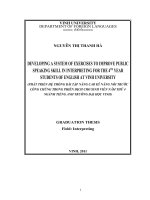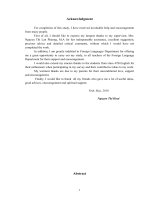THE COMPLETE MENTAL FITNESS BOOK Exercises to Improve Your Brain Power doc
Bạn đang xem bản rút gọn của tài liệu. Xem và tải ngay bản đầy đủ của tài liệu tại đây (5.82 MB, 236 trang )
COMPLETE
THE
MENTAL
BOOK
Tom Wujec
Exercises to
Improve Your
Brain Power
FITNESS The Complete
Mental Fitness Book
How would you rate your level of mental fitness?
C HIGH
My
mental performance is exceptional.
Just call me Leonardo.
D MEDIUM I occasionally think of
new
things and
sometimes challenge my thinking muscles.
O LOW
My
mind is like a bowl of tapioca pudding.
I'm in real need of
a
mental workout.
No matter which category
you
have selected,
remember that mental fitness — your ability to
concentrate, to reason, to visualize, to imagine, to make
decisions, to solve problems, and to think clearly and
creatively— depends greatly on how well and how
often you exercise your mind.
If you feel that you are mentally out of
shape,
then
cheer up, you can improve simply by taking the time to
work your mental muscles.
If you feel fit, then recognise that you still need
excercise to keep your mind in top shape. Even
Olympic athletes need practice
Now turn over the pages and read on
MENTAL FITNESS
BOOK
Exercises
to
Improve
Your
Brain Power
Tom Wujec
Orient®
Paperbacks
DELHI | MUM1AI | HTDCIAtAO
This
book is
dedicated
to my parents,
Alexandra Wujec,
•who showed me
thefun of discipline,
and
Stanley
Wujec,
who
showed me
the value of letting go.
www.orientpaperbacks.com
ISBN 13:978-81-222-0124-6
ISBN 10: 81-222-0124-5
1st Edition 1991
16th Printing 2009
The
Complete
Mental Fitness Book
©Tom Wujec, 1988
Cover design by Vision Studio
Published in arrangement with
Aurum Press Ltd., England
Published by
Orient Papetbacks
(A division of Vision Books Pvt. Ltd.)
Contents
Preface vi
Mack's Mental Gymnasium 7
Better Thinking and Thinking Better 11
Station 1 — Loosening Up 23
Station 2 — Mental Movement 35
Station 3 — Mental Calisthenics 51
Station 4 — Mental Gymnastics I 67
Station 5 — Mental Gymnastics II 86
Station 6 — Mental Strength 104
Station 7 — Mental Play 121
Station 8 — Reaching Back 135
Station 9 — Mental Flexibility 150
Station 10 — Mental Balance 165
Station 11 — Improvising 184
Station 12 — Peak Performance 199
Keeping Fit 213
Return to Mack's Mental Gymnasium 232
End Stuff: Answers to Puzzles and Problems 223
Preface
I
would like to thank Doubleday for their support, encouragement,
and enthusiasm for this project. I would also like to thank several
people who helped out on The Complete Mental Fitness Book Peter
Taylor, my agent, who saw its potential; Charlie Menendez for all
those inspiring conversations that went into the wee hours of the
morning; Brant Cowie for his design ideas; Maggie Reeves for
keeping the production on track and on time; Pippa Campsie, who
offered suggestions, ideas, and gave great lunches; Peter Turney, who
never failed to stimulate my brain; Barney Gilmore for generally
being an all-round inspiration; Chris Sasaki for his insights; Ken
Deaton for his real-time brainstorming; Wayne and Pam Weaver of
MainFrame Computer Graphics, and Patrick Lee of Interaxis, for their
technical wizardry; Larry and Ellen Oberlander for showing me that
there was a gymnasium; and E. J. for showing me what it means to
work out.
Most of all,
1
would like to thank my wife, Susan, for her thoughts
and suggestions, and for bearing through the long months of writ-
ing. I can never thank her enough for her patience, love, and sup-
port.
Tom Wujec
Toronto, Canada
MACK'S MENTAL GYMNASIUM
Mack's Mental
Gymnasium
T
om's mind felt like a bowl of vanilla pudding. He'd been in meet-
ings all day and now felt distracted and preoccupied, a feeling
that was becoming all too familiar. Recently his attention span
seemed to be getting shorter, and his ideas were increasingly
mediocre. Tom realized that he was thinking about the same old
things in the same old ways.
As he paced the familiar path back from work, he noticed a new
shop sign:
Interesting. On an impulse, Tom opened the door and went in.
Upstairs, Tom met Mack, an animated fellow with a sparkle in his
eye, who was the owner as well as the fitness coordinator. Tom ex-
plained, "I just don't seem to have the mental energy and flexibility
I used to have."
Mack thought for a moment and then asked Tom several ques-
tions.
"Have
you really challenged your mind
lately?"
"AIMS
Mack's
Mental
Gym
A Division of BetterThink
—
8
"Well, not that I can remember," Tom answered.
"How
often do you do nothing and relax?"
"I watch some TV. It helps me unwind."
"Haveyou been learning anything new?"
"You see, I just don't seem to have the time."
"What kind of food do you feed your mind?"
"Well, I read a newspaper every now and then."
The conversation went on like this for a while. Mack asked ques-
tions. about paying attention to everyday things, about searching for
problems and opportunities, about pursuing long-term goals, and
about learning for learning's sake. Finally Tom asked, "Well, where
do I stand?"
"There's no doubt about it," Mack announced. "You're mentally
out of shape.
"You see, in some ways, your mind is like your body. If it doesn't
get the exercise it needs, it becomes stiff and weak. If your brain
sits about idly, without ever working up a sweat, your mental
muscles become sluggish. This lack of conditioning can lead to har-
dening of the attitudes, poor circulation of ideas, gain in mental flab,
excessive tension, boredom, and, worst of all, mental constipation."
"How did I get this way?" Tom wanted to know.
Mack explained, "People get mentally out of shape when they
stop challenging their minds. This happens when you become men-
tally complacent and opt for quick, habitual solutions, rather than
purposeful thought. It also happens when you confine thinking to
a small range of interests. For example, some people are strong at
designing bridges and making good business decisions, but weak
at searching out creative ideas, or organizing their time, or holding
a good conversation, or telling a joke, or relaxing their minds. They
use their brain well in some ways, but not in others.
"When people stop having fun using their minds to search out new
ideas, by experimenting, by playing around with new possibilities,
they become mentally rigid. They forget that, to a large degree, their
world is created by their minds. They're. so busy focusing out-
side themselves that their insides suffer. Problems, worries, and res-
ponsibilities take the forefront and they forget to pause every
9
once in a while and think about how they think. A healthy mind is
able to move in different ways. To be at your best, you need to ex-
ercise all of your mental muscles, and only a well-rounded workout
will give you this."
Tom was astonished. What Mack was saying made so much sense,
and it was so simple. He said, "I can see that I've been letting some
of my mental muscles sit idly. And when I do use them, I use them
in the same old ways. Is it too late? Can I still get fit?"
"It's never too late to exercise," Mack replied. "Ideally everyday
circumstances should give us the challenges to stretch and flex all
our mental muscles. But if we get caught up in routine, or if we get
lazy, or if we don't have a good set of techniques for reaching our
potential, we need to pay a visit to the mental gymnasium."
Mack turned around and led Tom through a small doorway to a
spacious, brightly lit room: Mack's mental gymnasium. On the walls
were anatomical illustrations of various mental muscles — reason-
ing muscles, concentration muscles, visualization muscles — along
with techniques to exercise them. Scattered throughout the room
were several exercise stations. At each station, people were engaged
in different activities: talking, drawing, writing, laughing, concentrat-
ing. Tom figured out that people moved from one station to the next
when they wanted to exercise a different part of their minds.
Mack continued, "It takes time, patience', and determination to
eliminate old habits and replace them with new habits. But the ener-
gy you put into improving your thinking always pays you back with
improved creativity and productivity. Besides, as you learn how your
mind works (and how it doesn't), you'll have a lot of fun."
Tom felt as if he were about to embark on a long, invigorating ad-
venture. As he watched the people mentally jogging, power lifting,
and stretching, all of them obviously enjoying themselves, he real-
ized that he had found something he didn't consciously know he'd
been searching for: a place to really challenge and improve his mind
He turned to Mack with a smile and asked, "When can we start?"
Mack gave the answer he always gave. "Right now, of course."
10
BETTER THINKING
AND
THINKING BETTER
11
The Anatomy
of
Mental Fitness
"Strength of mind is exercise, not rest."
ALEXANDER POPE, 18th-century poet
EXERCISE How would you rate your level of mental fitness?
• HIGH My mental performance is exceptional.
Just call me Leonardo.
• MEDIUM I occasionally think of new things
and sometimes challenge my thinking muscles.
• LOW My mind is like a bowl of tapioca pudding.
I'm in real need of a mental workout.
N
o.matter which category you selected, remember that mental
fitness — your ability to concentrate, to reason, to visualize, to
imagine, to make decisions, to solve problems, and to think clearly
and creatively — depends greatly on how well and how often you
exercise your mind. If you feel that you are mentally out of shape,
then cheer up; you can improve simply by taking the time to work
out your mental muscles. If you feel fit, then recognize that you still
need exercise to keep your mind in top shape. Even Olympic ath-
letes need practice.
Making your thinking muscles stronger involves asking yourself:
How can I improve my mental performance?
First become familiar with the different mental muscles within your
mind. To do this, try the following exercise.
12
Mental Tour
Imagine that you
're
holding an orange.
Picture what it would feel like,
what it would look like,
and what it would smell like.
For a few moments,
try
to
form as clear an.image as you can.
Now imagine peeling off the skin,
pulling apart the segments,
and biting into a piece.
After a moment, examine a segment very closely.
Ask yourself what the orange would look like
if you could enlarge it a thousand times, or a million times.
What might the cells look like?
What might the molecules look like?
For the next couple of minutes,
try to become aware of everything
that you know and don't know about oranges.
Think about what makes an orange an orange,
why it tastes the way it does,
how many types of oranges there may be,
how oranges may have evolved through time,
what purposes oranges may serve,
and how to make a good orange marmalade.
As
you think about the orange,
pay close attention to the quality of your thoughts.
Put this book down for a moment and start thinking.
13
If you're like most people, you probably noticed that the longer you
thought about the orange, the more ideas, associations, and connec-
tions popped into your imagination. You may have thought about
the physical properties of oranges. You may have pondered the his-
tory and economics of oranges. You may even have considered the
fact that there is no English word that rhymes with "orange". As you
formed mental pictures, reached back into your memory, and
wondered, you shifted between one mode of thought and another:
you were moving different mental muscles.
CALCULATORIS PECTORIS
MEDIAL ANALYSIS
CONFRONTAL GLOBE
COGNITOID LATERALUS
MEDIAL SYNTHESIS
THINKTER
VERBULI ARTICULI
LATERAL LMAGINIJS
14









